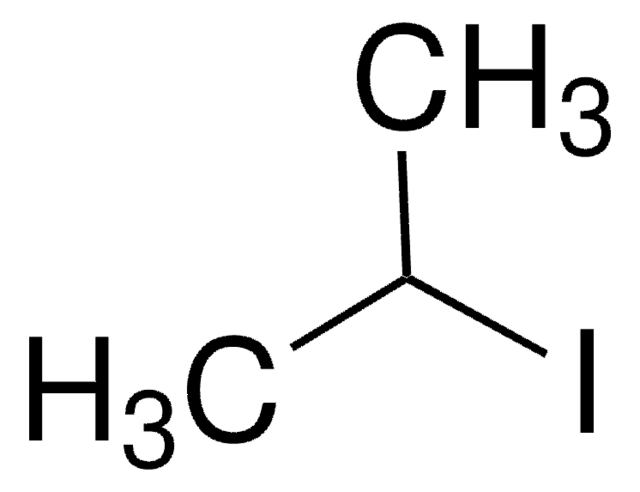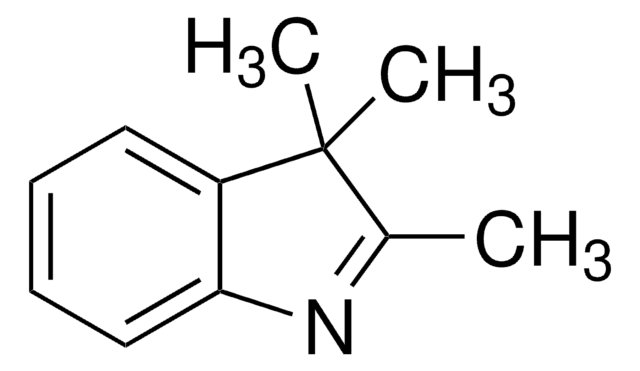238414
1,3-Diiodopropane
99%, contains copper as stabilizer
Synonym(s):
Trimethylene diiodide
Sign Into View Organizational & Contract Pricing
All Photos(1)
About This Item
Linear Formula:
I(CH2)3I
CAS Number:
Molecular Weight:
295.89
Beilstein:
1731117
EC Number:
MDL number:
UNSPSC Code:
12352100
PubChem Substance ID:
NACRES:
NA.22
Recommended Products
Quality Level
Assay
99%
form
liquid
contains
copper as stabilizer
refractive index
n20/D 1.642 (lit.)
bp
111-113 °C/31 mmHg (lit.)
density
2.576 g/mL at 25 °C (lit.)
functional group
iodo
storage temp.
2-8°C
SMILES string
ICCCI
InChI
1S/C3H6I2/c4-2-1-3-5/h1-3H2
InChI key
AAAXMNYUNVCMCJ-UHFFFAOYSA-N
Looking for similar products? Visit Product Comparison Guide
Related Categories
General description
The adsorption of 1,3-diiodopropane on a molybdenum-aluminum alloy thin film formed on dehydroxylated alumina has been studied.
Application
1,3-Diiodopropane has been used in the preparation of synthetically challenging bridged 1,2,4,5-tetraoxanes.
Signal Word
Warning
Hazard Statements
Precautionary Statements
Hazard Classifications
Eye Irrit. 2 - Skin Irrit. 2 - STOT SE 3
Target Organs
Respiratory system
Storage Class Code
10 - Combustible liquids
WGK
WGK 3
Flash Point(F)
235.4 °F - closed cup
Flash Point(C)
113 °C - closed cup
Personal Protective Equipment
dust mask type N95 (US), Eyeshields, Gloves
Choose from one of the most recent versions:
Already Own This Product?
Find documentation for the products that you have recently purchased in the Document Library.
Customers Also Viewed
Gemma L Ellis et al.
Bioorganic & medicinal chemistry letters, 18(5), 1720-1724 (2008-02-05)
Here we present an efficient route into synthetically challenging bridged 1,2,4,5-tetraoxanes. The key to the success of this route is the use of H(2)O(2) and catalytic I(2) to form the gem-dihydroperoxide followed by a Ag(2)O mediated alkylation using 1,3-diiodopropane. Using
Feng Gao et al.
The journal of physical chemistry. B, 110(25), 12555-12571 (2006-06-28)
The adsorption of C3 hydrocarbons propylene, 1-iodopropane, and 1,3-diiodopropane is studied in ultrahigh vacuum on a molybdenum-aluminum alloy formed by molybdenum hexacarbonyl reaction with a planar alumina film grown on a Mo(100) substrate. Carbon-iodine bond scission occurs below approximately 200
Shyamala Pillai et al.
Journal of fluorescence, 22(4), 1021-1032 (2012-03-28)
A variety of contemporary analytical platforms, utilized in technical and biological applications, take advantage of labeling the objects of interest with fluorescent tracers-compounds that can be easily and sensitively detected. Here we describe the synthesis of new fluorescent quinoline and
Our team of scientists has experience in all areas of research including Life Science, Material Science, Chemical Synthesis, Chromatography, Analytical and many others.
Contact Technical Service
















